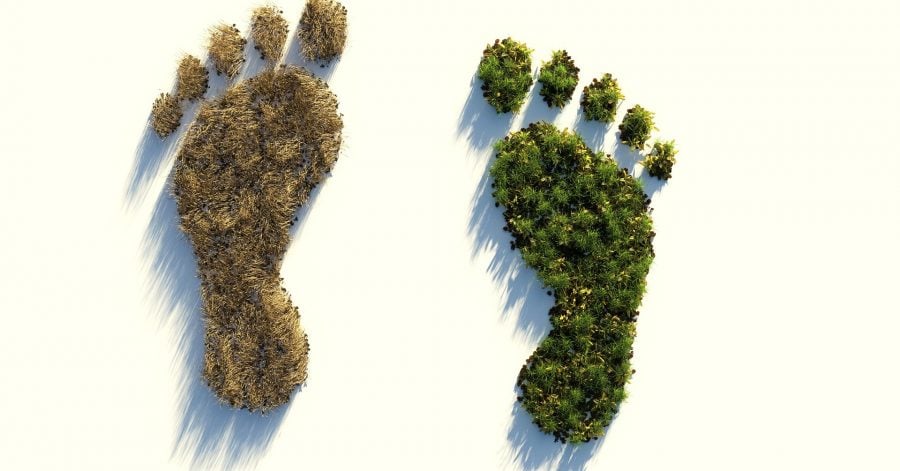As of November 2021, there were 4.41 million apps available for users to download, from only 500 when the iOS Store was launched in 2008. For all the benefits that apps have brought to our modern lives, helping us understand our individual environmental footprint and assisting us on the way to make small changes, might be one of the most thoughtful uses to date.
From providing estimates of the carbon emissions we generate in our daily activities, to offering spaces to exchange goods and services, thus saving resources and preventing waste, apps can both guide and enable more thoughtful choices.
The Recursive made a list of 11 B2C environment-focused apps of companies and organizations connected to Southeast Europe that we believe are worth checking out. Read on to learn more about their story, and how they can help you.
11 apps to help you improve your environmental footprint
Apps to help you reduce your carbon footprint
Verdoo
In a nutshell: Discounted shopping for a social cause
The story: A social startup based in Romania, Verdoo is on a mission to turn online purchasing into a carbon-neutral experience. The platform works through a free browser extension, which users can install in order to access various offerings and discounts for travel, clothes, electronics, and others. Verdoo partners with merchants and then takes a commission fee, which it partly redirects towards Eden Reforestation Projects. Launched in April 2021, they already work with retailers such as Booking.com, AliExpress, and FashionDays.
Eco.track
In a nutshell: Tracking the environmental footprint of daily activities
The story: A newly launched app in Brasov, Romania, Ecotrack aims to help users calculate the CO2 emissions they save through various activities. The platform also uses gamification to incentivize users to make green choices, by providing various discounts. Users can track the carbon footprint of mobility activities, depending on the transportation method chosen, as well as eco-friendly actions like planting trees or limiting phone usage. Ecotrack was launched by Romanian association “Creștem România Împreună“.
2030 Builders
In a nutshell: Gamifying taking actions to improve personal footprint
The story: 2030 Builders is developing an educational digital platform that uses gamification to help organizations engage employees on sustainability topics. In the platform, employees can explore various modules, take actions, and earn green coins in reward, which can help them unlock new quests or donate to the cause supported by the company. The company, co-founded by Mia Negru, a Romanian established in Denmark, has recently participated in the ClimAccelerator Black Sea program for Romania and Bulgaria.
Forest Inspector
In a nutshell: A tool for citizens to prevent illegal logging
The story: The app was relaunched at the beginning of 2021 by The Romanian Ministry of Environment, Water and Forests. If you want to verify whether a certain timber shipment truck has approval for that activity, you can enter the car registration details in the platform’s database. This is the consumer-focused element of a bigger project launched by organizations in Romania in order to track down and prevent illegal logging, an enduring challenge for the country.
Apps to help you reduce waste
Harta Reciclarii
In a nutshell: A map that guides you to waste collection points
The story: Harta Reciclării (The Recycling Map) is one of the first and largest national, interactive online platforms that enable the identification and location of separate collection waste points in Romania. Users can contribute to the map database by adding new collection points, as well as providing feedback on the existing points. The map was launched by ViitorPlus, a non-profit organization created in 2006 to develop programs with social and environmental impact.
Sofia2Go
In a nutshell: Reducing food waste in the HoReCa sector
The story: Our current “consumer society” demands excess production, resource use, and waste creation. Apps such as Sofia2Go aim to enable a way for consumers and producers to collaborate on improving our collective environmental footprint. The platform focuses on preventing food waste by offering restaurants, hotels, and cafes a marketplace where they can sell unwanted food at discount. This year, the Bulgarian startup was selected as one of the 30 semi-finalists of the European Social Innovation Competition out of 560 applications submitted by teams from 17 EU countries.
Skopje goes Zero Waste
In a nutshell: Raising awareness of the opportunity in going “zero waste”
The story: This initiative from North Macedonia offers an online platform for products with eco-friendly or no packaging from small local producers. Products include personal care and household cleaning items. Earlier this year, the project was one of the winners in the RISE program for social entrepreneurship organized by the Association for Social Innovation.
Bonapp.eco
In a nutshell: A mobile app to help you combat food waste
The story: Solutions for food waste reduction are available in the Romanian market, as well. Through its app, bonapp.eco connects users to nearby grocery stores, bakeries, cafes, restaurants, or hotels, to order food items at discounted prices. They launched in November 2021, and include partners such as Starbucks, Cora, PENNY Romania, foodpanda, and Up.
Toboro
In a nutshell: Peer-to-peer rental and borrowing made easy
The story: Romanian startup Toboro has a smart premise: we don’t need to buy the products we want to use only once. Why not borrow them instead and improve our environmental impact? Through the app, users will be able to rent and borrow products from other users with ease. Owners can upload photos, decide the availability of the product, and set up the price. The projects recently won the grand prize at the Future Makers incubator organized by Social Innovation Solutions in Romania.
estiverde
In a nutshell: An e-commerce platform that avoids single-use plastics
The story: Romania-based estiverde is an online store launched in 2019 to provide eco-friendly alternatives to day-to-day personal care and household use products. One focus has been avoiding plastic packaging in all the products and packaging in which they are delivered. Instead, the brands offered through the platform use materials such as aluminum, paper, or cotton. They also partner with social enterprises and small businesses that create local, handmade products.
FoodObox
In a nutshell: Surprise food boxes that help prevent food waste
The story: In Bulgaria, FoodObox connects consumers to local stores, restaurants, bakeries, salad bars, which sell surplus meals at discount prices. The treat is that users can order surprise boxes, and find out the exact content when picking up the order. The company calculated that through each box sold on the platform, they help save 2.5 kg in carbon emissions.








